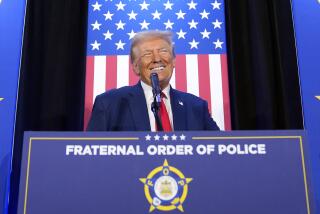Crime Drop a Boost for Clinton, a Challenge for GOP
- Share via
WASHINGTON — The new FBI report that violent crime nationwide dropped again last year is sending ripples through the presidential campaign, providing a boost for President Clinton and another setback for Republican efforts to make crime a central issue in the race.
While Clinton said Sunday’s report of a 4% drop in violent crime is evidence his policies are working, Republicans were reduced to finding clouds on the horizon, and wondering if crime issues will have the political traction for the party that they have in the past.
Republicans argue that the new FBI report masks an increase in violent crime among youth, and they warned that demographic trends may produce an explosion of violent crime later as baby boomers’ children grow into their teens.
“These statistics are good, and I’m glad to see them, but they are misleading and we shouldn’t be lulled into any false sense of security,” said Rep. Bill McCollum (R-Fla.), chairman of the House Judiciary subcommittee on crime. “We are going to have a major crime storm upon us very, very soon.”
*
Haley Barbour, chairman of the Republican National Committee, said that abstract statistics do little to calm people frightened by crimes in their communities and in the news. “The burst of random, senseless, unexplainable violent crime means Americans are more concerned for their personal security,” he said.
House Republicans plan to push the crime issue again today when they advance new crime-fighting bills, including one to require police to disclose the addresses and other information about violent sex offenders released from prison.
Sen. Bob Dole, the likely GOP presidential nominee, and his fellow Republicans have repeatedly tried to raise questions about Clinton’s record as a crime-fighter--hammering at Clinton’s judicial appointees as soft on criminals and accusing him of ignoring the drug problem until the election year came around. But Republicans had difficulty with the issue in 1992, in part because of Clinton’s support for the death penalty and his advocacy of adding 100,000 officers to the nation’s police departments. There is no indication yet that 1996 will be different.
In the past, GOP presidential candidates have used the crime issue to portray Democrats as liberals out of touch with the concerns of mainstream Americans. But with crime rates going down and Clinton continuing to promote his police-force proposal, many analysts believe he may effectively have inoculated himself against the charge of being soft on crime.
“For a long time no matter what Democrats said, no one believed” they were for tough law enforcement, said Gerald M. Caplan, dean of the McGeorge School of Law in Sacramento and a former Justice Department official. “That’s not true for Clinton.”
Even Dole has acknowledged that the burden is on him to prove Clinton’s record doesn’t match his tough-on-crime rhetoric.
“President Clinton may talk the same language as I do on many of these issues,” Dole said recently in a major address on crime. “But as, I’m sorry to say, with so many things, his actions profoundly depart from the meaning of his words.”
The partisan skirmishing comes at a time when many polls show increased public concern about crime. But the polls also indicate that neither Clinton nor Dole has established himself as the clear favorite on the issue. In one recent Gallup survey, for example, 45% of those polled approved of Clinton’s handling of crime issues and 48% disapproved. For Dole, 39% approved and 39% disapproved.
Also, while public concern about crime remains high, voters do not necessarily see it as the most important issue they want to hear candidates talk about. A Los Angeles Times Poll in mid-April found that 9% of those surveyed said they wanted the candidates to address crime--compared with 18% who cited the economy and 16% who cited health care.
A centerpiece of the GOP attack on Clinton’s crime record has been criticism of his judicial appointments. The attack builds on the controversy stirred in January when federal District Judge Harold Baer Jr. in New York threw out evidence in a drug case. Dole called for his impeachment, but Clinton also jumped in to repudiate the judge’s decision.
Since then, Dole has broadened his attack and named other Clinton appointees he regards as indulgent of criminals. He returned to that theme in response to Sunday’s FBI report.
“One of the first steps toward restoring safety, fairness and civility is to stop the Clinton administration’s practice of appointing liberal judges who place criminal rights over victims’ rights,” said Christina Martin, a Dole campaign spokeswoman.
*
But some scholars say Republicans will have a hard time portraying many of Clinton’s judges as stereotypical liberal activists who coddle criminals and hogtie police.
“The Clinton administration has made a very determined effort to avoid liberal activists and to lower the ideological temperature of the selection process,” said Sheldon Goldman, a professor of political science at the University of Massachusetts at Amherst.
On some crime issues, Clinton has made it harder for Dole. For example, Clinton signed the anti-terrorism legislation produced by the Republican-controlled Congress, including a landmark provision to limit death row appeals. Dole responded by arguing that the White House had sought to weaken the death-penalty provision.
On other crime issues, Dole may be on the defensive. Clinton aides see political gold in Dole’s support for repealing the ban on some assault weapons--a top priority of the National Rifle Assn. that is unpopular with most other voters.
Another area of dispute between Clinton and Dole is the president’s cops-on-the-beat plan, which under the 1994 crime bill was supposed to provide matching grants to encourage local communities to hire more police officers.
The Republican National Committee, in a recent memo, revived criticisms that the GOP used effectively against the 1994 legislation, labeling it a “pork-laden excuse for a crime bill” that included crime-prevention programs like midnight basketball. The RNC contends that more than half of eligible communities had not applied for matching funds to hire more police because they could not afford it.
And at least some Democrats concede Clinton may still be vulnerable on that issue.
But some Republicans think the GOP has made an offsetting political mistake in opposing the Clinton police initiative.
A memo to conservative Republicans circulated by the New Citizenship Project, a think tank chaired by Republican strategist Bill Kristol, warned that Republicans were opening themselves to charges of opposing police.
More to Read
Get the L.A. Times Politics newsletter
Deeply reported insights into legislation, politics and policy from Sacramento, Washington and beyond. In your inbox three times per week.
You may occasionally receive promotional content from the Los Angeles Times.











